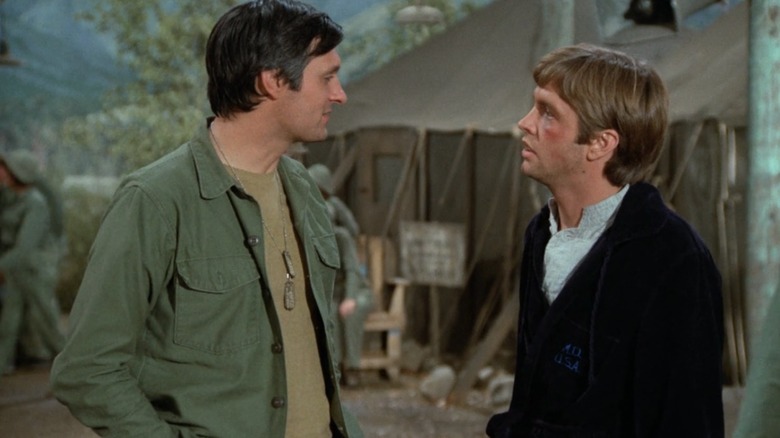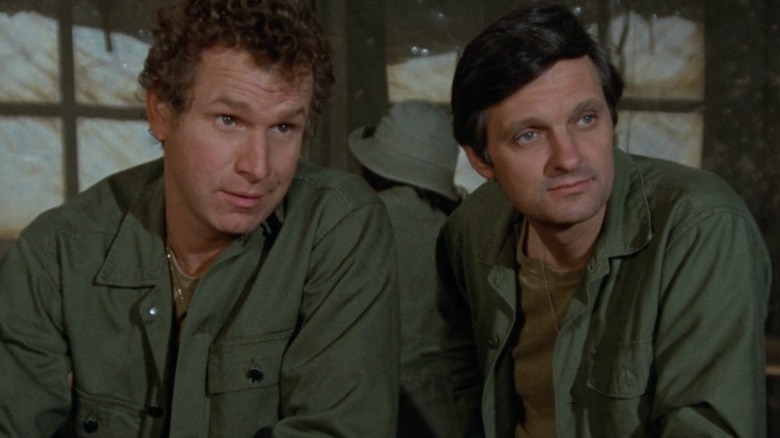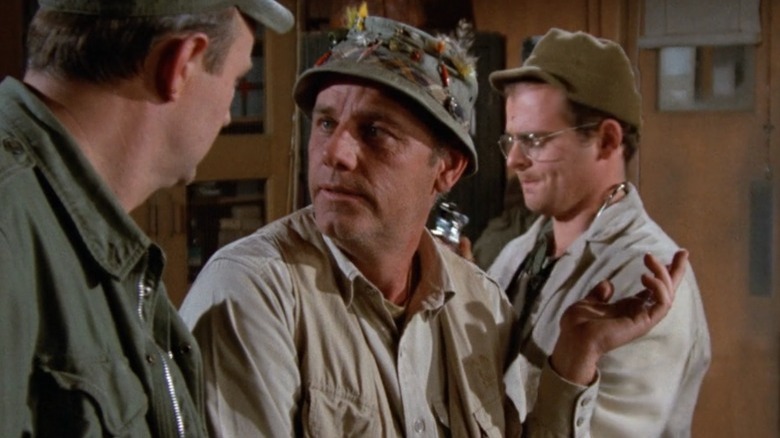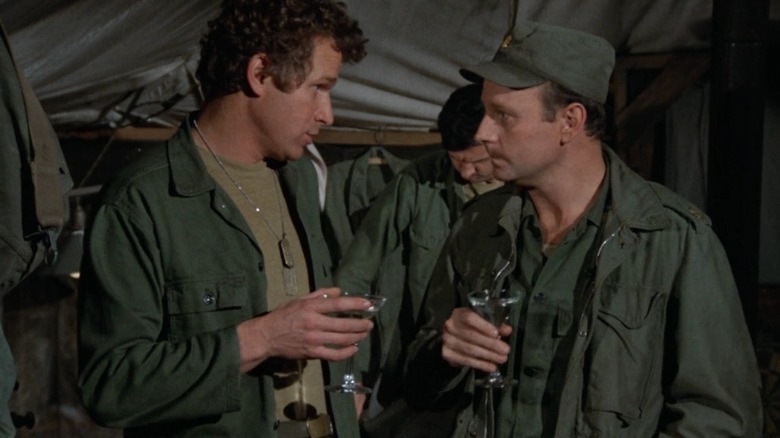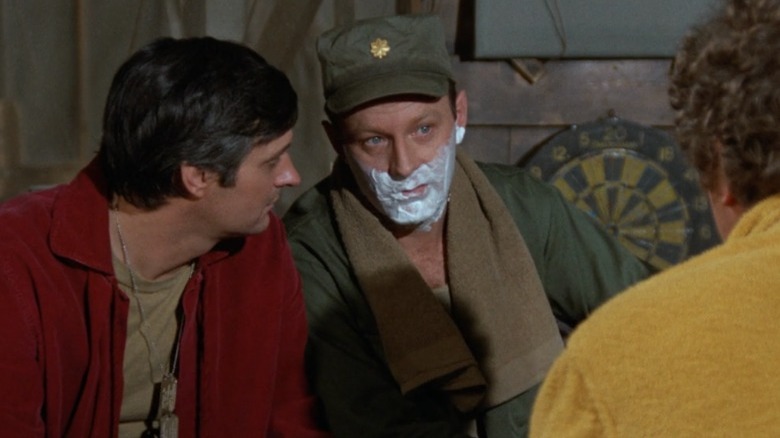One Of The Most Groundbreaking MASH Episodes Almost Ended Very Differently
The beloved Korean War sitcom "M*A*S*H" tackled plenty of pertinent topics during its eleven-season run, from PTSD to racism to addiction and beyond. Yet few of its episodes are as casually groundbreaking as "George," a second-season outing that sees surgeons Hawkeye (Alan Alda) and Trapper (Wayne Rogers) try to help a gay army man avoid homophobia within the ranks of the U.S. military.
"M*A*S*H" turns 50 in September of this year, but its deep compassion and progressive attitudes feel as timely now as they were back then. In the case of "George," the 1974 episode was almost even bolder than the version that aired, but in the end, it got stuck with a studio-approved ending that at once undermines and streamlines its sensitive subject matter.
George's secret
"George" begins with the 4077th MASH unit operating on a man with significant bruises that they suspect came from some type of brawl. After he recovers, Private George Weston (Richard Ely) opens up to Hawkeye, telling him that two people in his outfit were beat up: a person of color and a homosexual. Given that George is a white man, this is his coded way of coming out.
The episode, which was the first of the series written by John W. Regier and Gary Markowitz, makes sure its heroes treat George's sexual identity as neither a problem nor even a novelty. Unlike many sitcoms then and now, no characters — aside from one glaring exception — even treat George like he's the first gay person they've met. This makes sense, given that in real life, thousands of queer military men serving during the 20th century received "blue discharges" for being "undesirables" or chose to keep their sexuality a secret.
When George confides in Hawkeye, he replies with a couple of easy, unrelated jokes that let George and the audience know he's cool with it, then promises he'll keep George's secret. When he later tells Trapper, over a game of shot glass checkers, his friend is just as unperturbed. The pair aren't talking about it to gossip, but in empathy, as they're concerned that George will be unsafe returning to the same homophobic unit (a plot that's never resolved). "Don't you understand, the man is not normal!" bigot Frank (Larry Linville) yells at Hawkeye after the pair's attempt to cover for George fails. "What's normal, Frank?" Hawkeye responds, and spends the rest of the episode deriding his self-righteous coworker for his biases.
CBS nixed the original ending
"George" addresses the topic of gay men serving in the military an astounding 36 years before the repeal of Don't Ask, Don't Tell officially allowed LGBT+ service members the right to be out in the military. It's a smartly built episode that positions sniveling, holier-than-thou Frank, who aims to get George dishonorably discharged, as the camp's one and only face of homophobia. Meanwhile, others in camp, including Henry (McLean Stevenson) and Radar (Gary Burghoff) are virtually non-reactive to the news of a gay man among their ranks.
The episode culminates in a rather roundabout scheme to stop Frank from sending off his discharge request. Trapper pretends he agrees with Frank after all in order to get his colleague to open up about cheating on a test in medical school. The reveal serves as a two-pronged foil to Frank's plan, as the pair leverage it over him both as blackmail material and as proof that he has no room to judge anyone else. "People who live in glass tents!" Trapper quips.
But the episode almost ended much differently, with a final scene that could have either driven its point home even more clearly, or obscured it further, depending on its execution. On a 2021 episode of the "M*A*S*H" Matters podcast, Markowitz explained that he and Regier originally planned for an ending that saw Hawkeye and Trapper get Frank drunk, only to talk him into revealing his own same-sex attractions. "There was kind of this hint of hmm, you know, maybe you have a little bit of question about your own sexuality," Markowitz shared. "Maybe that's why you're making such a big deal about this."
Frank, booze, and sexy tattoos
Though Markowitz doesn't get too deep into the details of the original scene, he says it included the trio chatting about the past, culminating in Frank reminiscing about the memorable bicep tattoo of an uncle who used to visit in his youth. It's unclear if the writers meant a family friend or an actual relative (hopefully the former), but either way, the plot involved Frank admitting to lusting after a man. It's a realization that would make his single-minded crusade instantly seem hypocritical.
Of course, in 2022 the idea that all homophobic bullies are secretly closeted has become an overused stereotype. But at the time, it's a scene that, if executed as well as "M*A*S*H" typically pulled off its major moments, could have conveyed a genuinely judgement-free sexual fluidity among the men of the 4077th crew. That in itself would have been extremely groundbreaking, but CBS apparently had other plans.
"When we got the rewrite back, it had been drastically changed. It was all gone," Markowitz tells the podcast. He says that he and Regier went to the producers, a terrifying prospect for first-time writers, to explain why the cheating plot seemed less inclusive than the conclusion they'd originally intended. "Gosh, really? Do you really want to say that homosexuality is something in our past that we want to cover up?" he remembers asking. "They said look, we got a lot of pushback from CBS and this is what we had to come up with."
It's a message that still holds up
By the time the "George" aired in 1974, a handful of other recent shows had featured gay characters, including the docuseries "An American Family," the short-lived sitcom "The Corner Bar," and an episode of Norman Lear's "All in the Family." But small-screen depictions of LGBT+ characters were still new, and often laced through with hurtful humor and generalizations that make their progressive strides look less-than-groundbreaking by today's standards.
Thankfully, this episode of "M*A*S*H" features none of that. Even without an ending that could have introduced the idea that heterosexuality might not be the default for many people, "George" remains one of the "M*A*S*H" episodes that best captures the show's radically compassionate ethos. Whether it's Hawkeye telling Frank he needs to get his brain quarantined for claiming that homosexuality is an illness, or Leiutenant Colonel Henry Blake refusing to sign off on Frank's complaint, the episode is full of identity-affirming moments of allyship and understanding that are as vital today as they were nearly 50 years ago.
